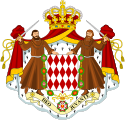
Monaco, officially the Principality of Monaco, is a sovereign city-state and microstate on the French Riviera a few kilometres west of the Italian region of Liguria, in Western Europe, on the Mediterranean Sea. It is a semi-enclave bordered by France to the north, east and west. The principality is home to nearly 39,000 residents as of the 2020s, of whom about 9,500 are Monégasque nationals. It is recognised as one of the wealthiest and most expensive places in the world. The official language of Monaco is French. Monégasque, English and Italian are also spoken and understood by many residents.
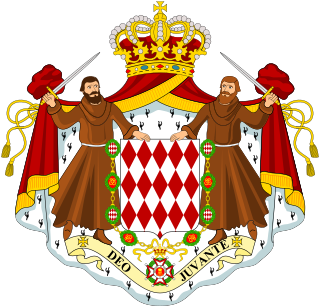
The Principality of Monaco is a sovereign and independent state, linked closely to France by the Treaty of July 1918, which was formally noted in Article 436 of the Treaty of Versailles of 1919. The foreign policy of Monaco is one illustration of this accord: France has agreed to defend the independence and sovereignty of Monaco, while the Monegasque Government has agreed to exercise its sovereign rights in conformity with French interests, whilst at the same time maintaining complete independence. Since then, the relations between the sovereign states of France and Monaco have been further defined in the Treaty of 1945 and the Agreement of 1963.
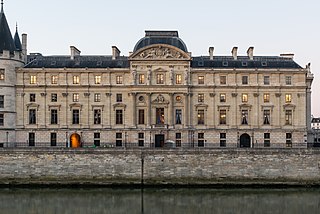
The Court of Cassation is the supreme court for civil and criminal cases in France. It is one of the country's four superior courts, along with the Council of State, the Constitutional Council and the Jurisdictional Disputes Tribunal.

In France, the Conseil d'État is a governmental body that acts both as legal adviser to the executive branch and as the supreme court for administrative justice, which is one of the two branches of the French judiciary system. Established in 1799 by Napoleon as a successor to the King's Council, it is located in the Palais-Royal in Paris and is primarily made up of top-level legal officers. The Vice President of the Council of State ranks as the ninth most important civil servant in France.
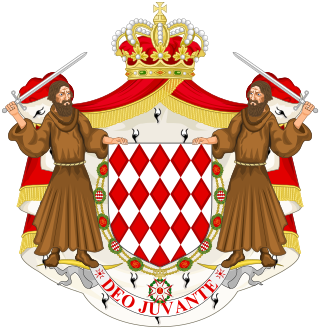
The sovereign prince is the monarch and head of state of the Principality of Monaco. All reigning princes and princesses have taken the name of the House of Grimaldi. When Prince Rainier III died in 2005, he was Europe's longest reigning monarch. The Grimaldi family, which has ruled Monaco for eight centuries, is Europe's longest-ruling royal family.
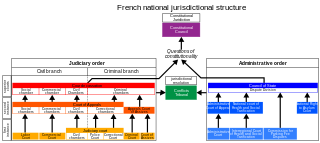
French law has a dual jurisdictional system comprising private law, also known as judicial law, and public law.

The Public Security of Monaco is the national police force of the Principality of Monaco. It is subordinated from the Monegasque Department of Interior and consists of 515 men and women. With 515 police officers for 35,000 people in 198 hectares, Monaco has the largest per-capita and per-area police force and police presence in the world. Its police includes a specialist unit which operates patrol and surveillance boats.

The Supreme Court is the highest civil and criminal court in Burundi. It has nine members, including the Court President, who are nominated by the Judicial Service Commission and appointed by the President of the Republic after the approval of the Senate. The court's president is referred to as the Chief Justice.

The Monegasque Supreme Court is the highest court of law in the city-state of Monaco for judicial appeals, administrative matters as well as ensuring the constitution of Monaco is upheld. It consists of three full judges and two assistant judges, appointed by the Prince of Monaco at the recommendation of the National Council of Monaco, the Crown Council, the Council of State, the Court of First Instance and the Court of Appeal. This is done in the ratio of one judge per institution. The Supreme Court was established in 1962 following the new constitution to guarantee fundamental liberties.

Franco-Monegasque relations are the special relationship between the French Republic and the Principality of Monaco.

The judiciary of Belgium is similar to the French judiciary. Belgium evolved from a unitary to a federal state, but its judicial system has not been adapted to a federal system.
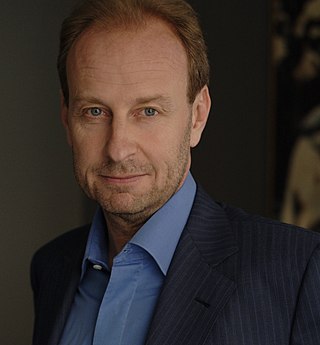
The Bouvier Affair was a number of international lawsuits that started in 2015, and subsequent events. The lawsuits, initiated by Russian oligarch Dmitry Rybolovlev, allege that Swiss art shipper and dealer Yves Bouvier defrauded him by misrepresenting the original cost of art works and subsequently overcharging them. The affair has played out in courts in Monaco, Switzerland, France, the United States, Hong Kong and Singapore.

In France, a cour d’appel of the ordre judiciaire (judiciary) is a juridiction de droit commun du second degré, an appellate court of general jurisdiction. It reviews the judgments of a tribunal judiciaire. When one of the parties is not satisfied with the trial court’s judgment, the party can file an appeal. While decisions of a court of first instance are termed "jugements" in French, a court of appeals hands down an arrêt, which may either affirm or reverse the judgment of the court below. An arrêt (judgment) of the court of appeals may be further appealed en cassation. If the appeal is admissible at the cour de cassation, that court does not re-judge the facts of the matter a third time, but may investigate and verify whether the rules of law were properly applied by the lower courts.
The French judiciary courts, also known as "ordinary courts", are one of two main divisions of the dual jurisdictional system in France, the other division being the administrative courts.

Conscription in Monaco existed during a brief time between 1848 and 1870 when the Monégasque Militia was active. Since then, Monégasque citizens have been exempt both from conscription and direct taxation.

The Court of Appeal is a court of the second level of the judiciary in civil, criminal, commercial and administrative matters in the Principality of Monaco. The Court of Appeal judges on appeals of judgments delivered by the Court of First Instance. The Court of Appeal has a remarkable position in the Monegasque justice system due to its regulatory function, which is both judicial and legal. On the legal side, many of the Court’s judgments constitute law references establishing the Monegasque State of Law. On the judicial side, the Court contributes to guaranteeing that the institution of justice will comply both with law and professional ethics.
The High Council of Judges and Prosecutors is a collegial body invested with a preponderant role within the framework of the administration of justice of the Principality of Monaco. The High Council of Judges and Prosecutors was instituted by the law n° 1364 of November 16, 2009 relating to the statute of the magistracy. In November 2018, the new members of the High Judicial Council have been introduced in their new functions, under the chairmanship of Laurent Anselmi, Director of Judicial Services.

The Treaty of Stupinigi was signed on November 8 and 10 1817, in Stupinigi between Honoré V, Prince of Monaco, and Victor Emmanuel I of Sardinia.
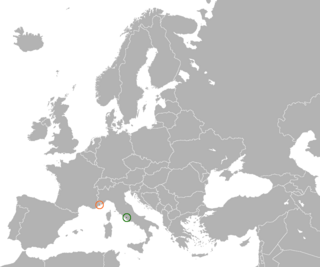
Holy See–Monaco relations are bilateral relations between the Principality of Monaco and the Holy See. The principal Monégasque official is Ambassador Claude Giordan, who officially started at his position in November 2015. The Holy See is represented by its Apostolic Nuncio, Archbishop Antonio Arcari, who assumed office on May 25, 2019. The Embassy of Monaco to the Holy See is located in Rome, on Largo Spinelli. The Apostolic Nunciature to Monaco is non-residing as the nuncio currently resides in Rome.
The law of Cambodia refers to the legal system of the judiciary of Cambodia, which is primarily based on legal codes and statutes, with precedents and local custom also playing an important role. Cambodia has a civil law legal system with legal codes, which were greatly influenced by France, to a lesser extent by Japan, and also adapted to Cambodian circumstances. The Constitution of Cambodia enacted with the restoration of Monarchy in 1993 and it is the supreme law in Cambodia. An independent judiciary has the power to review laws and government acts for constitutionality.
